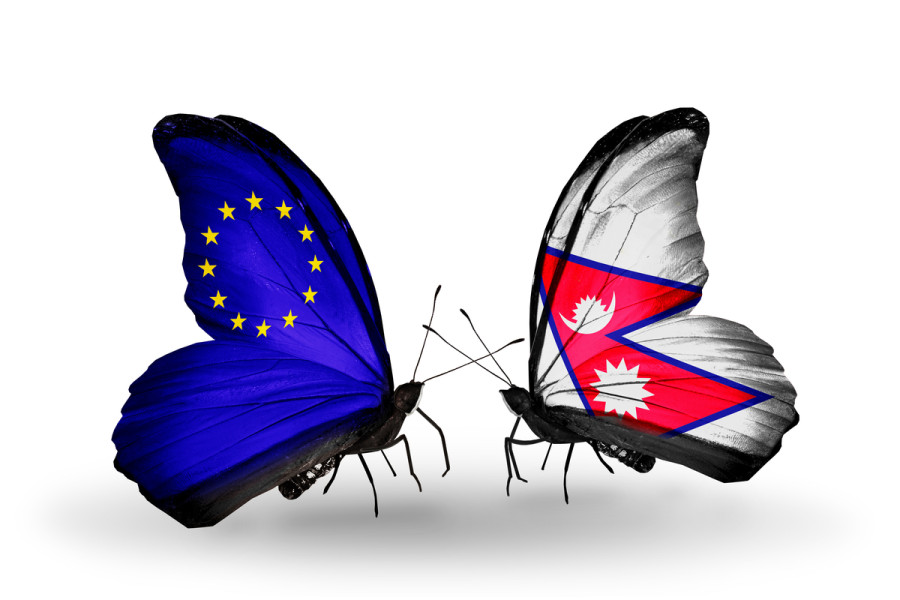Columns
Nepal after LDC graduation
The preferential market access facility will no longer be available to Nepali exporters.
Shiv Raj Bhatt
The European Union (EU) is an important trade and investment partner of Nepal. It is the third largest export destination and among the top 10 investment inflows in Nepal. As a least developed country (LDC), Nepal enjoys many necessary international support measures, including preferential market access and special and differential treatment. Nepal has duty-free market access in European markets under the EU's Everything but Arms provisions.
The EU's Everything but Arms (preferential market access) remains a vital market access tool for Nepal. In 2019, Nepal's exports to EU markets were €61.1 million, and Nepal has a very high utilisation rate of the Everything but Arms Generalised System of Preferences (GSP) facility. Approximately 90 percent of Nepal's exports to EU markets use this facility.
Graduation and implications
Of the three indices that the United Nations Committee for Development Policy considers critical—Gross National Income per capita, Human Assets Index and Economic and Environmental Vulnerability Index, Nepal met the thresholds for the latter two in the last three consecutive triennial reviews (2015, 2018 and 2021) thus becoming eligible for graduation. In February 2021, the Committee for Development Policy recommended Nepal's graduation from the LDC category with a five-year preparatory period, making it effective from 2026.
In light of the criteria, it is evident that Nepal's LDC graduation will have implications for the country's trade and investment sectors. In general, the resultant repercussions might not be profound partly because Nepal has not been able to use the trade preferences linked to its LDC status. However, post-graduation, Nepal's exports will face a substantial loss in EU markets. The preferential market access facility under the Everything but Arms scheme will no longer be available to Nepali exporters after graduation and completion of the transition phase.
The International Trade Centre estimates that Nepal would stand to lose $59 million in exports upon graduation from LDC status in 2026 (4.3 percent of the total exports projected for that year), and a substantial part of this loss will be in the EU markets.
Foreign direct investment is generally not attached to LDC status. It mainly depends on the availability of resources (factor of production), ease of doing business, political stability, tax regime, infrastructure, labour productivity, repatriation facility and other essential factors.
However, while foreign direct investment is not attached to LDC status, graduation from LDC should lift the collective self-confidence of leaders, policymakers, the business community and citizens of Nepal. Plus, factors like availability of resources, ease of doing business, political stability, tax regime, infrastructure, labour productivity and repatriation facility are associated with a better business environment. They will have a positive impact on influencing private sector growth, including attraction for foreign investors.
Moreover, attracting foreign direct investment can be an effective means for investment stimulation and ensuring export success. Foreign direct investment has a prominent role in expanding exports and export diversification. This was the experience of many Asian countries, including Cambodia, China, Malaysia and Vietnam. With a higher income and improved human assets and economic structure, foreign investors will have a more positive attitude towards investing in Nepal, which may result in an increased inflow of foreign investment (both public and private) and a better trading environment. The spill-over effects can also benefit local firms by facilitating industrial upgrading and enhancing participation in global value chains.
In this context, Nepal needs to work on appropriate measures to harness the opportunities created and overcome challenges that will result from the country's LDC graduation. Opting for a GSP+ facility is one of the options for sustaining exports in EU markets. However, to become a beneficiary of the GSP+ facility, Nepal needs to apply for the GSP+ scheme. It must fulfil the standard GSP conditions for eligibility and meet two additional criteria.
The first is the vulnerability criteria, which comprises (a) The import share criterion, requiring that the country's share of GSP-covered imports must remain below 6.5 percent of GSP-covered imports of all GSP countries; and (b) The diversification criterion, stipulating that the seven most significant sections of GSP-covered imports must constitute 75 percent of imports from the beneficiary country over three years. The second is the sustainable development criterion which requires the applicant country to have ratified and effectively implemented certain international conventions on labour rights, human rights, environmental protection and good governance, among others.
Nepal clearly satisfies the first criteria, including the vulnerability and diversification provisions. The sustainable development criterion requires the applicant country to have ratified and effectively implemented 27 international conventions listed in the EU's GSP regulation and six new international instruments recently added to the list.
Unfortunately, Nepal fails the sustainable development criterion, as it has not ratified all the core international conventions listed in the GSP regulation. Notably, Nepal will have to ratify and implement the Freedom of Association and Protection of the Right to Organise Convention and the Cartagena Protocol on Biosafety (2000) to become eligible for the EU's GSP+ scheme, among others. The ongoing EU-supported Investment Support Programme can support further assessment and consultations with the relevant government agencies on the status and continued efforts towards ratifying those international conventions, which will help Nepal meet sustainable development criteria and qualify for the GSP+ scheme.
Ratify the conventions
Further, to become a beneficiary of the GSP+ scheme, Nepal must ratify the said conventions without reservations. In addition, the most recent conclusions of the monitoring bodies under those conventions must not identify any severe failure in the implementation. Therefore, proper and timely planning and dialogue between the EU and the government of Nepal are needed to strengthen EU-Nepal trade and investment cooperation, especially considering the upcoming LDC graduation of Nepal.
The possibility of signing a comprehensive Economic Partnership Agreement is another option that may help Nepal sustain and enhance exports to the EU market and play an instrumental role in investment promotion and other economic cooperation between Nepal and the EU as the pact is more comprehensive in coverage. However, opting for an Economic Partnership Agreement will need thoughtful preparations, dialogue, and negotiations with the EU. The resulting agreement will also need to be ratified by Nepal's Parliament.




 9.89°C Kathmandu
9.89°C Kathmandu















